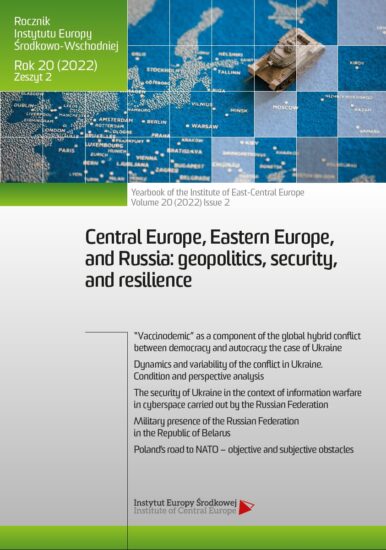ORCID: Szczepan Czarnecki: 0000-0002-1363-194X
ORCID: Emilia Szyszkowska: 0000-0002-8837-6824
Afiliacja: Warsaw School of Economics, University of Opole
Pages: 167-185
Edition: Lublin 2022
DOI: https://doi.org/10.36874/RIESW.2022.2.10
Citation method: E. Szyszkowska, S. Czarnecki, Together or apart? Explaining cooperation patterns across the post-communist organized interests, „Rocznik Instytutu Europy Środkowo-Wschodniej” 20(2022), z. 2, s. 167-185, DOI: https://doi.org/10.36874/RIESW.2022.2.10.
Keywords: access, CEE, Central Eastern Europe, cooperation, interest groups, membership
Abstract: Interest groups constitute a specific civil society voice in democratic politics. They operate in a situation of constant friction between two main strategic goals: keeping the organization alive and exerting political influence. This article explores both topics, examining factors conditioning the group’s tendency to cooperate with others as well as the degree to which such cooperation facilitates access to policy-making apparatus, exploring the post-communist environment of four selected Central Eastern Europe (CEE) countries and three policy areas: energy, healthcare and higher education policy. The authors aim to apply and examine the interest groups’ cooperation patterns from the EU level to the CEE regional level. The article finds strong support for somewhat weak cooperation between interest groups in the region. However, even such moderate cooperation clearly affects the possibility of access to both the ruling parties and the parliaments. In particular, the cooperation of groups in the field of joint statements may turn out to be a form of remedy for the weaknesses of interest groups in the region.
Bibliography:
Albareda A., Prioritizing professionals? How the democratic and professionalized nature of interest groups shapes their degree of access to EU officials, “European Political Science Review” 2020, vol.12, pp. 485-501.
Beyers J., Policy Issues, Organisational Format and the Political Strategies of Interest Organisations, “West European Politics” 2008, vol. 31, pp. 1188-1211.
Beyers J., Braun C., Ties that Count. Explaining Interest Group Access to Policymakers, “Journal of Public Policy” 2014, vol. 34, pp. 93-121.
Beyers J., De Bruycker I., Lobbying Makes (Strange) Bedfellows: Explaining the Formation and Composition of Lobbying Coalitions in EU Legislative Politics, “Political Studies” 2018, vol. 66, no. 4, pp. 959-984.
Binderkrantz A.S., Beyers J., Pedersen H.H., What is access? a discussion of the definition and measurement of interest group access, “European Political Science” 2017, vol. 16, pp. 306-321.
Cronk L., Leech B., Meeting at Grand Central: Understanding the social and evolutionary roots of cooperation, Princeton 2012.
De Bruycker I., Beyers J., Balanced or Biased? Interest Groups and Legislative Lobbying in the European News Media, “Political Communication” 2015, vol. 32, no. 3, pp. 453-474.
Dür A., Mateo G., The Europeanization of interest groups: Group type, resources and policy area, “European Union Politics” 2014, vol. 15, no. 4, pp. 572-594.
Eising R., Institutional Context, Organizational Resources and Strategic Choices Explaining Interest Group Access in the European Union, “European Union Politics” 2007, vol. 8, no. 3, pp. 329-362.
Heaney M.T., Outside the Issue Niche: The Multidimensionality of Interest Group Identity, “American Politics Research” 2004, vol. 32, no. 6, pp. 611-651.
Heaney M.T., Lorenz G., Coalition portfolios and interest group influence over the policy process, “Interest Groups & Advocacy” 2013, vol. 2, pp. 251-277.
Hojnacki M., Interest Groups’ Decisions to Join Alliances or Work Alone, “American Journal of Political Science” 1997, vol. 41, no. 1, pp. 61-87.
Hojnacki M., Organized Interests’ Advocacy Behaviour in Alliances, “Political Research Quarterly” 1998, vol. 51, no. 2, pp. 437-459.
Hula K.W., Lobbying Together: Interest Group Coalitions in Legislative Politics, Washington 1999.
Jones B.D., Baumgartner F.R., The Politics of Attention. How the Government Prioritizes Problems, Chicago 2005.
Klüver H., Lobbying in the European Union: Interest Groups, Lobbying Coalitions, and Policy Change, Oxford 2013.
Mahoney C., Baumgartner F.R., The determinants and effects of interest-group coalitions, 2004, https://fbaum.unc.edu/papers/Mahoney_Baumgartner_APSA_2004_Coalitions.pdf.
Mahoney C., Networking vs. Allying: The Decision of Interest Groups to Join Coalitions in the US and the EU, “Journal of European Public Policy” 2007, vol. 14, no. 3, pp. 366-383.
Mahoney C., Baumgartner F.R., Partners in Advocacy: Lobbyists and Government Officials in Washington, “Journal of Politics” 2015, vol. 77, no. 1, pp. 202-215.
Rasmussen M.K., The battle for influence: the politics of business lobbying in the European Parliament, “JCMS: Journal of Common Market Studies” 2015, vol. 53, no. 2, pp. 365-382.
Sabatier P., An Advocacy Coalition Framework of Policy Change and the Role of Policy-Oriented Learning Therein, “Policy Sciences” 1988, vol. 21, no. 2/3, pp. 129-168.
Salisbury R., Heinz J., Laumann E., Nelson R., Who Works with Whom? Interest Group Alliances and Opposition, “American Political Science Review” 1987, vol. 81, pp. 1217-1234.
Sorurbakhsh L., Interest group coalitions and lobbying environments: toward a new theoretical perspective, “Interest Groups & Advocacy” 2016, vol. 5, pp. 200-223.
Stevens F., De Bruycker I., Influence, affluence and media salience: Economic resources and lobbying influence in the European Union, “European Union Politics” 2020, vol. 21, pp. 1-23.
Tarrow S., Power in Movement: Social Movements and Contentious Politics, Cambridge 1994.
Wonka A., De Bruycker I., De Bièvre D., Braun C., Beyers J., Patterns of conflict and mobilization: Mapping interest group activity in EU legislative policymaking, “Politics and Governance” 2018, vol. 6, no. 3, pp. 136-146.
Young M., Developing Interests: Organizational Change and the Politics of Advocacy, Lawrence 2010.
Zald M.N., McCarthy J.D., Resource Mobilization and Social Movements: A Partial Theory, [in:] Social Movements in an Organizational Society: Collected Essays, M.N. Zald, J.D. McCarthy, W.A. Gamson (eds.), New York 1987

PDF: Download